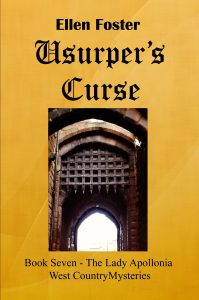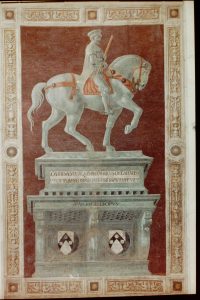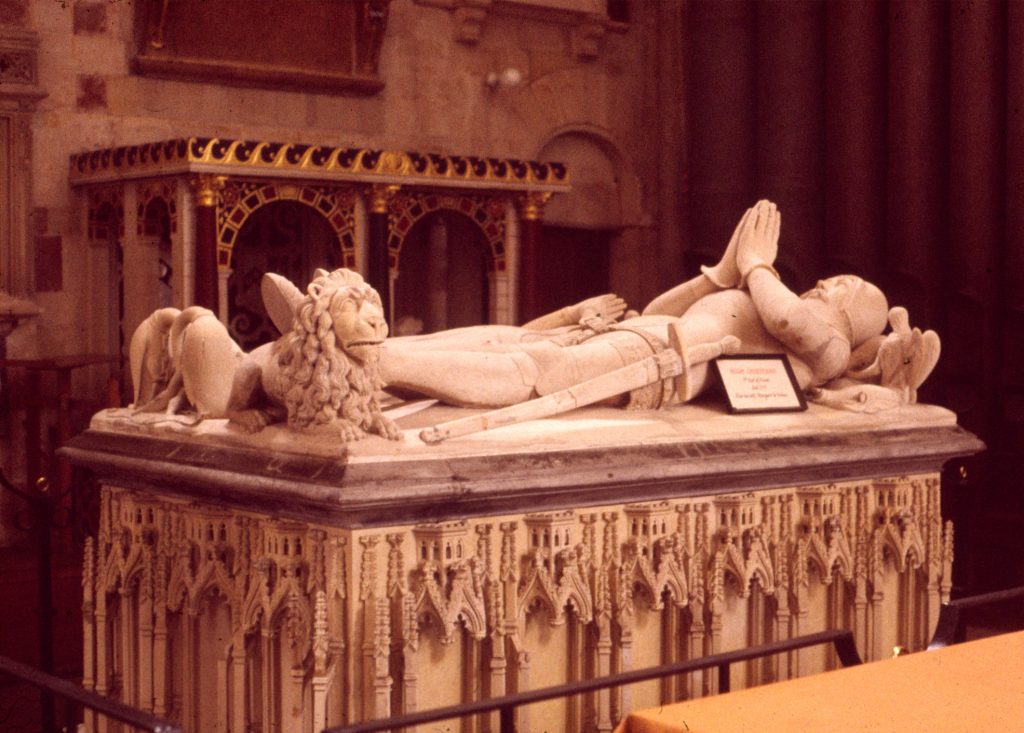 Greetings again and thanks for joining us as we continue examining topics which arise in Usurper’s Curse, the seventh book in my Lady Apollonia West Country Mysteries Series. In this monthly posting, I am writing of chivalry and knights, topics that make important appearances in this story.
Greetings again and thanks for joining us as we continue examining topics which arise in Usurper’s Curse, the seventh book in my Lady Apollonia West Country Mysteries Series. In this monthly posting, I am writing of chivalry and knights, topics that make important appearances in this story.
Two fictitious knights appear in my novel who represent very different concepts of medieval knighthood. Sir Julian Thurston of Wiltshire considers himself to be a knight errant while Sir Hardolph of Leicester is an example of a mercenary knight. One of the most famous mercenary medieval knights in real life was John Hawkwood who was so honored in Florence, Italy, that his equestrian statue, shown below on the right, is featured in the nave of that city’s duomo.
The term “knight errant” came into use in the 14th century for a romantic notion of knighthood that developed in earlier centuries as the knights of the round table or knights seeking the holy grail. Sir Julian Thurston may have considered himself a knight errant, but the term “errant” refers to wandering or roving the countryside. He did not wander around seeking knightly duels or courtly love, however. Rather, he wanted to be of service to his king and would go wherever, to serve as needed.
The historian Ian Mortimer estimates there were about 1100 knights in England in the 14th century. Their rank in the nobility was ususally below that of barons but above esquires and gentlemen. The armor they wore for fighting in combat or tournaments weighed between 80 and 100 pounds. The effigy shown at the end of this posting is a 14th century knight in his armor.
Mercenaries were people hired by a private individual or company for operations which may not relate to their king’s needs. This idea goes back to ancient times and continued through the Middle Ages.
My heroine, the Lady Apollonia, suspects that Sir Hardolph had been hired by someone who was not acting in the best interests of King Henry IV of England. Part of the mystery for her was whether her suspicions were true and, if so, who had hired Sir Hardolph.
 Medieval chivalry is defined in the glossary of my novel as rules and ideal qualifications for a medieval knight: courage, courtesy, generosity, valour, and dexterity in arms. This listing is obvious except for courtesy which had a somewhat different meaning in medieval times. In the glossary of some of my novels, courtesy is described: “in the understanding of those followers of Julian of Norwich from about 1400, courtesy means loving respect implying not only indulgence of another but also goodness granted freely despite sinful behavior. Mother Julian describes God as our ‘Courteous Lord’”.
Medieval chivalry is defined in the glossary of my novel as rules and ideal qualifications for a medieval knight: courage, courtesy, generosity, valour, and dexterity in arms. This listing is obvious except for courtesy which had a somewhat different meaning in medieval times. In the glossary of some of my novels, courtesy is described: “in the understanding of those followers of Julian of Norwich from about 1400, courtesy means loving respect implying not only indulgence of another but also goodness granted freely despite sinful behavior. Mother Julian describes God as our ‘Courteous Lord’”.
A knight such as Sir Julian Thurston would have aspired to the idea of medieval chivalry while a mercenary knight such as Sir Hardolph would not. The young man, named Waldef in my novel, aspired to chivalry as the dominating force guiding his life, extraordinary goals for a teenager. For more details, read Usurper’s Curse.
